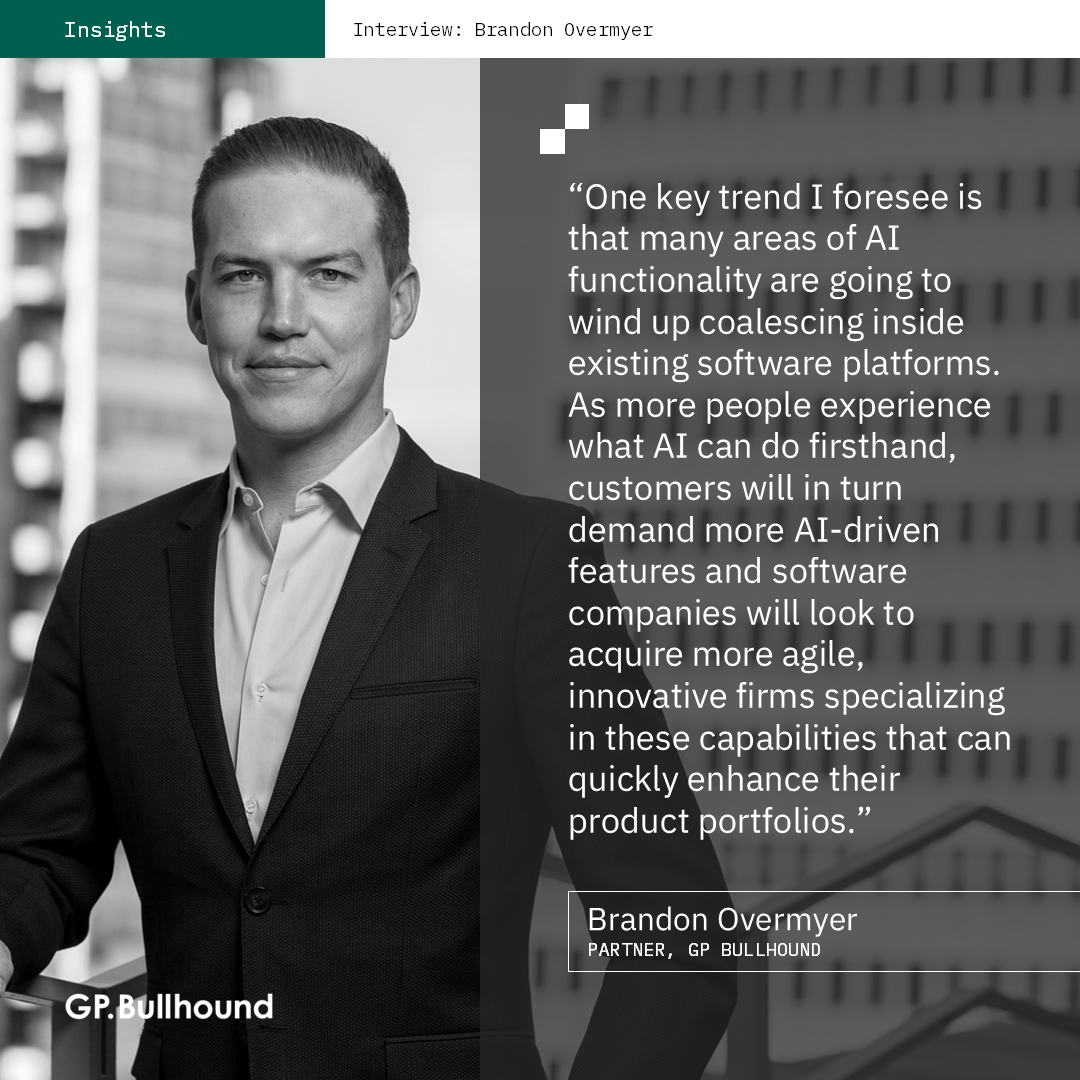Enterprise Software in the Age of Generative AI

Welcome to GP Bullhound, Brandon! What excites you most about leading the Enterprise Software practice, and how do you plan to leverage your expertise in Gen AI and emerging technologies to enhance GP Bullhound’s leadership in the software sector?
Thank you! I am a technologist at heart, constantly exploring and building with tools and code in my spare time and staying up to date with the most cutting-edge advancements in AI, which are progressing daily. At GP Bullhound, I’m eager to leverage this enthusiasm and expertise to not only differentiate us from the competition but also provide unique value to our clients by working closely with them to pursue large, transformative private capital raises and M&A opportunities.
I’m genuinely excited to lead the Enterprise Software practice, especially at a time when transformative tech—and particularly Gen AI—is reshaping the business landscape. The software market is constantly evolving, and with Gen AI’s dramatically increasing capabilities, there are always new, scalable ways to drive efficiency, innovation, and shareholder value across virtually every industry.
You’ve advised many Enterprise Software companies. How do you see Gen AI reshaping the Enterprise Software market, and where do you think the biggest opportunities lie for these companies?
Generative AI is transforming the Enterprise Software market, redefining how businesses operate, make decisions, and engage with customers. With advanced capabilities in automation, data analysis, and natural language processing, Gen AI enables deeper insights, streamlined workflows, and highly personalized interactions, creating entirely new business models.
The most immediate opportunities lie in vertical-specific solutions, where Gen AI directly addresses industry-specific needs. In sectors like healthcare, finance, and manufacturing, it can enhance predictive analytics, automate compliance, optimize supply chains, and much more. Companies across all sectors that integrate Gen AI early will set new standards in their industries, gaining a strong competitive edge.
As enterprises become more comfortable with Gen AI, demand will rise for solutions that offer seamless integration, customization, and transparency—driving growth in “AI as a service” and providing software companies with ongoing revenue streams as they adapt to evolving technology.
Given your background in M&A, IPOs, and capital market transactions, what are some key trends you foresee for strategic deals within the Enterprise Software sector in the near future?
Over the next several quarters, AI and Cloud-native solutions are expected to play a significant role in strategic deals in Enterprise Software. Companies need to expand their capabilities in Gen AI, cybersecurity, and data analytics to stay competitive, which is likely to drive a wave of acquisitions targeting companies with specialized, scalable tech.
One key trend I foresee is that many areas of AI functionality are going to wind up coalescing inside existing software platforms. As more people experience what AI can do firsthand, customers will in turn demand more AI-driven features and software companies will look to acquire more agile, innovative firms specializing in these capabilities that can quickly enhance their product portfolios. This trend will especially hold true in vertical-specific software, where companies require highly tailored AI functionalities to serve their customers.
Another major trend is the emphasis on customer experience and personalization, and this is more of an acceleration than something entirely new. As businesses seek to create more meaningful connections with consumers, they increasingly turn to software that leverages AI to deliver highly personalized experiences and predictive insights. I expect to see more strategic deals aimed at acquiring technologies that enable hyper-personalization, real-time analytics, and enhanced user experiences, which are now essential for customer retention and competitive differentiation.
Finally, with the rise in cyber threats—partly due to the potential of Gen AI in the hands of malicious actors—cybersecurity will become an ever more critical focus. I expect strategic deals will increasingly aim to consolidate companies offering advanced cybersecurity solutions, including the latest advancements in, threat detection and response, zero-trust frameworks, and cloud security writ large.
GP Bullhound is known for working closely with innovative Enterprise Software companies. How do you see the firm’s approach aligning with your vision for supporting the next generation of Enterprise = companies?
GP Bullhound’s approach to working with high-growth, innovative companies is an amazing, natural fit with my vision for supporting the next generation of software category leaders. We prioritize long-term partnerships, focusing on deeply understanding each company’s unique strengths, challenges, and growth potential.
Frankly, our technical depth and enthusiasm offer a distinct advantage over our competitors. These qualities are both fundamental to finding the strategic and investment opportunities that will deliver the most meaningful impact for our clients. By helping them identify strategic M&A opportunities or raise capital, we support their sector leadership and sustainable growth.
By combining GP Bullhound’s drive for innovation and my expertise in Gen AI, we can provide software companies unique, future-oriented perspectives, positioning, and advice. We’re not just helping them grow today; we’re empowering them to shape the future of software.
As we look ahead to 2025, what are your predictions for the biggest technological advancements or shifts that will shape the Enterprise Software landscape?
In 2025, I anticipate that one of the biggest shifts in the Enterprise Software landscape will be the rise of AI agents and agentic workflows, transforming how employees approach their roles. I believe individual employees will increasingly operate with their own “miniature business” composed of multiple AI agents working in tandem to handle repetitive tasks, analyze data, and even make routine decisions. This paradigm shift could enable an efficiency and productivity gain not seen since the industrial revolution.
These AI-driven workflows will empower employees to focus on high-value, creative, and strategic tasks while delegating operational and analytical work to AI agents. For example, sales teams might use AI agents for personalized customer engagement at scale, finance departments could streamline compliance, reporting, and analytics, and HR teams might employ agents to handle onboarding, training, and employee support. The impact of this transformation will span functions and industries, dramatically enhancing efficiency and output.
As a result, companies that invest early in deploying these AI agent ecosystems will see exponential returns as their employees leverage this newfound capacity to innovate and drive value elsewhere in the organization. The companies who lean forward into Gen AI within their operations will play a crucial role in building the frameworks, tools, and integrations that make these agentic workflows seamless and adaptable at scale, enabling any business to harness the full potential of AI-driven productivity.
Learn more about Brandon Overmyer: https://www.gpbullhound.com/team/brandon-overmyer/



